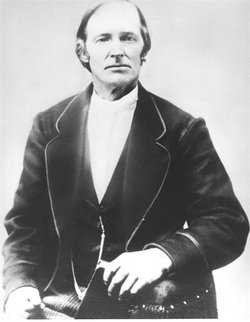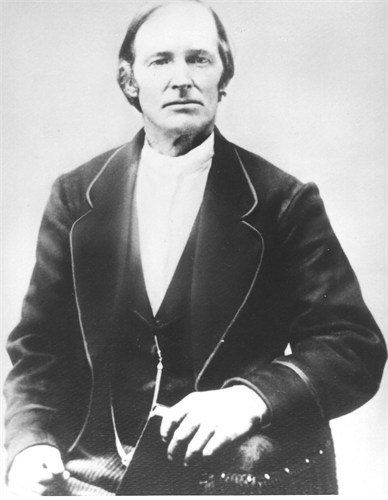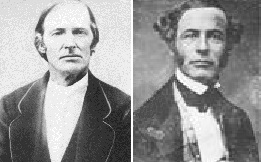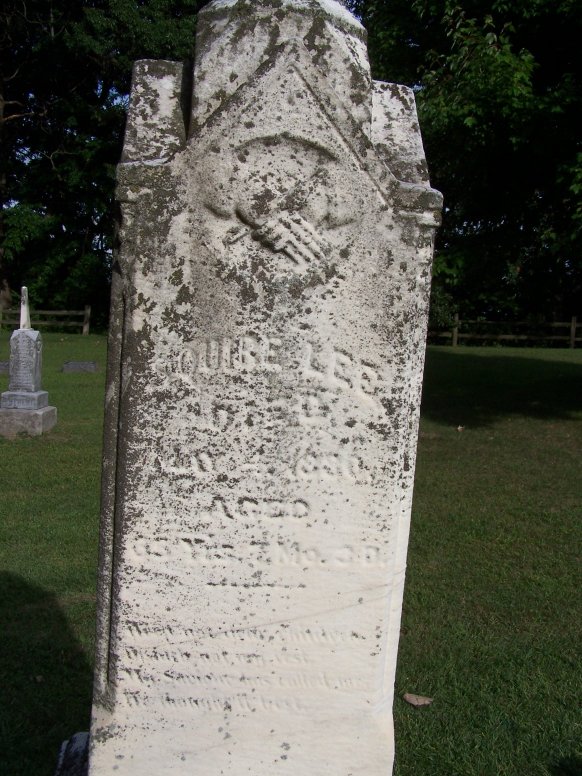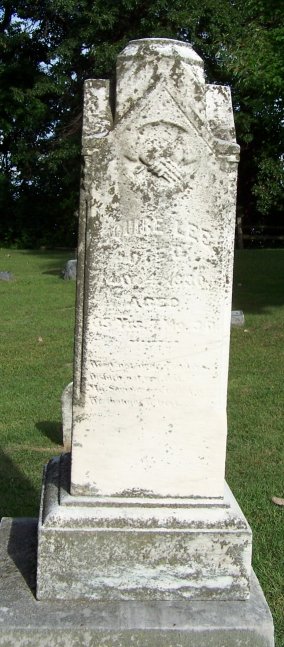One large gravestone marks the graves of Squire Edward and wife Fannie Sowders Lee at Gordon Cemetery on the west side of Lake Vermilion. The inscription reads:
"Weep not dear children
Disturb not my rest
My Saviour has called me
He thought it best."
There is a persistent Lee Family Legend that Squire is a third cousin of General Robert E. Lee. Squire was a Lincoln supporter and strong Union man during the Civil War. Squire seemed to disapprove of his distant cousin's betrayal of the Union. Squire is thought to have destroyed evidence connecting him with the Virginia Lees. Although the Legend remains unproven, the family resemblance is striking.
Lees Had Ties To Land of Lincoln
Squire Lee of Blount Township, Gen. Lee Were 3rd cousins
by Larry Weatherford, The Commercial-News, Danville, IL, August 26, 2012
In 1829, just one year before Tom Lincoln, his wife and children made that now-famous move to Illinois, a man named William Henry Lee settled with his family here in Vermilion County. Both family names would soon be marked indelibly into the history books of America.
There were a lot of Lees on the early census rolls of Vermilion County. By 1860, William Henry Lee’s son, Squire Edward Lee, was a well-known and respected landowner and farmer with a family of his own. It was an election year, and Squire Edward voted for Tom Lincoln’s son, Abraham, who had spent a good deal of time in Vermilion County himself over the past 20-some years.
Little did either family know that this Western state they were calling home would one day be known as the “Land of Lincoln.” Or that one of the most respected officers in the United States Army, a third cousin of Squire Edward Lee, would soon lead the forces of a new Army for the Confederate States of America in what Lincoln would call a “great Civil War.”
Squire was Lee’s first name, not a title, even though the Lees were about as close to titled gentry as you could come in America. His line of the Lee family included two signers of the Declaration of Independence, an attorney general of the United States, two governors, and the Revolutionary War hero who would make the famous statement at George Washington’s funeral: “First in war, first in peace and first in the hearts of his countrymen.”
Those were just some of the renowned Lee family members. The most famous Lee relative was just beginning to achieve his fame. Among his achievements, Robert E. Lee had been a hero of the Mexican War, engineered the port at St. Louis, MO, and had led the capture of John Brown at Harper’s Ferry.
When southern states started to secede, Robert E. Lee chose to turn down an offer to be the commander of the Union forces. He then resigned his post in the U.S. Army, and accepted a commission in the new Confederate States Army. Most of Lee’s immediate family went along with his decision and followed him into the service of the South.
That choice didn’t come without some division in the Lee family. Not only did Squire Edward Lee support the Union while living in Illinois, but many of Lee’s other cousins and family members in Virginia also aligned with the Union. One would even become a rear admiral in the U.S. Navy.
Squire Edward Lee’s homestead and the majority of his land holdings were in Blount Township near what is now Hungry Hollow Road past Woodbury Hill. He lived there with his wife, Fanny, and their children. Other farmland he owned was near Catlin.
It is doubtful that Squire Edward let his friends and neighbors know that he was related to Robert E. Lee, since he was living in the home state of the commander-in-chief of the Union forces. Some of Squire’s descendants believe he tried to hide that fact because he was living in northern territory. They have wondered about their relationship to the famous Lee family for many years, and some say the records were intentionally made unclear on the lineage.
Descendants of another William Henry Lee who also had moved to Vermilion County in 1829 could not establish a tie to the famous Lee family. They even tried DNA testing, and found that they were not related to Robert Edward or Squire Edward Lee.
Even though the records were somewhat muddy as to the relationship of Squire Edward to Robert E. Lee, my friend and fellow researcher, Alan Woodrum, and I were on the track of what one descendant had called a “silver bullet” that tied Squire to the famous Lee family.
Third cousins:
While I was poring over books and genealogy information on the Lee family, Alan e-mailed to let me know that he had found the connection. As we had thought, it was on the Richard Henry Lee side of the family. Rather than second cousins as the oral family history had indicated, Robert Edward and Squire Edward were third cousins.
Squire’s mother was Sarah Crockett Lee. So, as you might expect, the family history has it that she was related to frontiersman, Congressman and hero of the Alamo, Davy Crockett. That has yet to be proven.
Squire Lee died on May 4, 1880. He and several of his family members are buried in the Gordon Cemetery near Lake Vermilion.
Posted with approval of Larry Weatherford,
October 19, 2014
One large gravestone marks the graves of Squire Edward and wife Fannie Sowders Lee at Gordon Cemetery on the west side of Lake Vermilion. The inscription reads:
"Weep not dear children
Disturb not my rest
My Saviour has called me
He thought it best."
There is a persistent Lee Family Legend that Squire is a third cousin of General Robert E. Lee. Squire was a Lincoln supporter and strong Union man during the Civil War. Squire seemed to disapprove of his distant cousin's betrayal of the Union. Squire is thought to have destroyed evidence connecting him with the Virginia Lees. Although the Legend remains unproven, the family resemblance is striking.
Lees Had Ties To Land of Lincoln
Squire Lee of Blount Township, Gen. Lee Were 3rd cousins
by Larry Weatherford, The Commercial-News, Danville, IL, August 26, 2012
In 1829, just one year before Tom Lincoln, his wife and children made that now-famous move to Illinois, a man named William Henry Lee settled with his family here in Vermilion County. Both family names would soon be marked indelibly into the history books of America.
There were a lot of Lees on the early census rolls of Vermilion County. By 1860, William Henry Lee’s son, Squire Edward Lee, was a well-known and respected landowner and farmer with a family of his own. It was an election year, and Squire Edward voted for Tom Lincoln’s son, Abraham, who had spent a good deal of time in Vermilion County himself over the past 20-some years.
Little did either family know that this Western state they were calling home would one day be known as the “Land of Lincoln.” Or that one of the most respected officers in the United States Army, a third cousin of Squire Edward Lee, would soon lead the forces of a new Army for the Confederate States of America in what Lincoln would call a “great Civil War.”
Squire was Lee’s first name, not a title, even though the Lees were about as close to titled gentry as you could come in America. His line of the Lee family included two signers of the Declaration of Independence, an attorney general of the United States, two governors, and the Revolutionary War hero who would make the famous statement at George Washington’s funeral: “First in war, first in peace and first in the hearts of his countrymen.”
Those were just some of the renowned Lee family members. The most famous Lee relative was just beginning to achieve his fame. Among his achievements, Robert E. Lee had been a hero of the Mexican War, engineered the port at St. Louis, MO, and had led the capture of John Brown at Harper’s Ferry.
When southern states started to secede, Robert E. Lee chose to turn down an offer to be the commander of the Union forces. He then resigned his post in the U.S. Army, and accepted a commission in the new Confederate States Army. Most of Lee’s immediate family went along with his decision and followed him into the service of the South.
That choice didn’t come without some division in the Lee family. Not only did Squire Edward Lee support the Union while living in Illinois, but many of Lee’s other cousins and family members in Virginia also aligned with the Union. One would even become a rear admiral in the U.S. Navy.
Squire Edward Lee’s homestead and the majority of his land holdings were in Blount Township near what is now Hungry Hollow Road past Woodbury Hill. He lived there with his wife, Fanny, and their children. Other farmland he owned was near Catlin.
It is doubtful that Squire Edward let his friends and neighbors know that he was related to Robert E. Lee, since he was living in the home state of the commander-in-chief of the Union forces. Some of Squire’s descendants believe he tried to hide that fact because he was living in northern territory. They have wondered about their relationship to the famous Lee family for many years, and some say the records were intentionally made unclear on the lineage.
Descendants of another William Henry Lee who also had moved to Vermilion County in 1829 could not establish a tie to the famous Lee family. They even tried DNA testing, and found that they were not related to Robert Edward or Squire Edward Lee.
Even though the records were somewhat muddy as to the relationship of Squire Edward to Robert E. Lee, my friend and fellow researcher, Alan Woodrum, and I were on the track of what one descendant had called a “silver bullet” that tied Squire to the famous Lee family.
Third cousins:
While I was poring over books and genealogy information on the Lee family, Alan e-mailed to let me know that he had found the connection. As we had thought, it was on the Richard Henry Lee side of the family. Rather than second cousins as the oral family history had indicated, Robert Edward and Squire Edward were third cousins.
Squire’s mother was Sarah Crockett Lee. So, as you might expect, the family history has it that she was related to frontiersman, Congressman and hero of the Alamo, Davy Crockett. That has yet to be proven.
Squire Lee died on May 4, 1880. He and several of his family members are buried in the Gordon Cemetery near Lake Vermilion.
Posted with approval of Larry Weatherford,
October 19, 2014
Family Members
Advertisement
Advertisement
